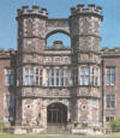|
Early surnames were derived from many different sources, such
as a person's trade, e.g. Carpenter, Miller, Baker; or a name which
records the type of person, e.g. Smart, Pretty, Small; and then there
are the names which decribe locality.
The name Brereton means "place of the brier"
(rose) or "a place covered with briers". Place means "ton",
and so we have "Brier-ton".
Source: The Brereton Story, compiled
by Elva Masters.
Here is some additional input on the Brereton name:
Many researchers have claimed that the Brereton name
originates in France, but there is little evidence to support this.
The main argument that has been used is that the name "Bretune"
can be traced back to Rouen, where some members of a family of that
name were buried. But no link has ever been established from them
to the Breretons of England. It is also interesting to note that
at the time (prior to 1066) very few people in France or England
possessed surnames and the "Bretune" could well refer to the place
where they came from,( Bretune or Briton, eg from Brittany).
The Brereton name originates from a place name, Brereton
in Cheshire, England. It is listed in the Doomsday book as "Bretone"
and was therefore in existence prior to the Doomsday survey. We
even know the name of the person who ruled the area at that time.
On the matter of surnames, it is important to keep in mind that
very few, if any of the people of those times had surnames, and
it became common practice to give your place of origin, or your
nickname or occupation as your second name. Thus William the Conquerer
was called, (without any malice) William the bastard, simply because
his father never wed his mother. His son was called William Rufus
because he had red hair. Even the kings of that time had no surname!
The place Brereton (it has also been spelt as Bretone,
Bretune and Brierton) is in Cheshire, part of the lands given by
William the Conquerer to Hugh the Fat, who became Earl Hugh of Chester,
in return for services rendered at Senlac (the battle of Hastings).
Hugh then parcelled out his new possessions among his soldiers who
fought in the battle, and whom Hugh would need to keep handy in
case the Saxons revolted. He gave Brereton to one Gilbert Hunter
as part of a larger area. As we have pointed out, Hunter was most
likely an occupation he had before becoming a soldier. Gilbert then
gave Brereton to two of his men, in return for their military services.
The only possible explanation of this is that the two men were brothers,
or more likely father and son. Whatever, one of them was our ancestor!
They would have begun to use the placename as their identifier or
surname, using the French style, as De Brereton.
It was not long after this time that the first De Breretons
began to appear in records and on gravestones. The "De" prefix was
finally dropped centuries later during the wars with France, when
it became unpopular (or unwise) to have a French sounding name.
Interestingly, Hugh the Fat recruited mainly in Brittany. This area
gained its name because it was where the Britons, (the original
Celtic ones) came to settle after being forced out of what is now
England by the invading Saxons. Normandy also got its name this
way, it was where the northmen, or Normans, settled. So there is
a possibility that our ancestors came from Britain origionaly. But
this is only conjecture. So either the placename was brought by
the Normans, as Bretune, or the Normans adopted the placename as
their surname. The second option is almost certainly the correct
one, as it is a fact that prior to the Normans there was a mill,
and therefore occupation and farming, on the site. The Normans,
who most likely could not read or write themselves, would simply
have taken the placename as their own.
Brereton, in old English, means farmstead of briars
or place of briar.
Source: Anthony Brereton, brereton@breretonhall.fsnet.co.uk
|
|
|

